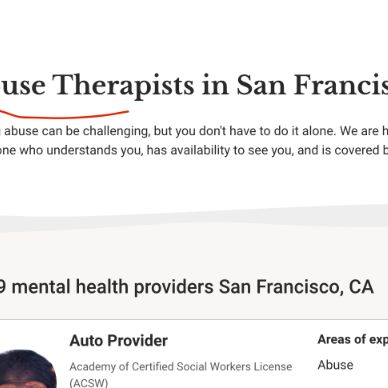
Aristotle Fernandez
Board Certified Behavior Analyst (BCBA), Certified Addiction Counselor (CAC), Audiologist, Certified Clinical Social Worker (CSW), Academy of Certified Social Workers License (ACSW), Advanced Practice Registered Nurse (APRN), Associate Marriage and Family Therapist, Certified Eating Disorder Specialist, Certified Group Psychotherapist (CGP), Certified Social Worker (CSW), Certified Trauma Professional, Community Resource, Counselor, Credentialed Sexual Abuse Youth Clinician (CSAYC), Diplomate in Clinical Social Work (DCSW), Education Specialist (EdS), Executive Function Coach, Hypnotherapist, Independent Substance Abuse Counselor, Licensed Addiction Counselor (LAC), Licensed Associate Counselor (LAC), Licensed Clinical Addictions Counselor (LCAC), Licensed Clinical Marriage and Family Therapist, Licensed Clinical Mental Health Counselor (LCMHC), Licensed Clinical Professional Counselor (LCPC), Licensed Clinical Social Worker (LCSW), Licensed Clinical Social Worker Associate, Licensed Graduate Social Worker, Licensed Independent Clinical Social Worker (LICSW), Licensed Marriage and Family Therapist (LMFT), Licensed Master Level Psychologist (LMLP), Licensed Master Social Worker (LMSW), Licensed Masters Addiction Counselor (LMAC), Licensed Mental Health Counselor (LMHC), Licensed Mental Health Practitioner (LMHP), Licensed Professional Clinical Counselor (LPCC), Licensed Professional Counselor (LPC), Licensed Psychological Examiner-Independent, Licensed Sex Offender Treatment Provider (LSOTP), Licensed Social Worker (LSW), Licensed Specialist Clinical Social Work (LSCSW), Limited Licensed Master Social Worker (LLMSW), Limited Licensed Professional Counselor (LLPC), Marriage and Family Therapist (MFT), Marriage, Family, and Child Counselor (MFCC), Massage Therapist, National Certified Counselor (NCC), Neuropsychologist, Nurse Practitioner, Nurse Psychotherapist, Nutritionist, Occupational Therapist
1951 Tavern Court, Alpine, California 91901
Aristotle Fernandez is a Board Certified Behavior Analyst (BCBA) in Alpine, California. They treat Phobia, Depression, Paranoid Personality.
tt













